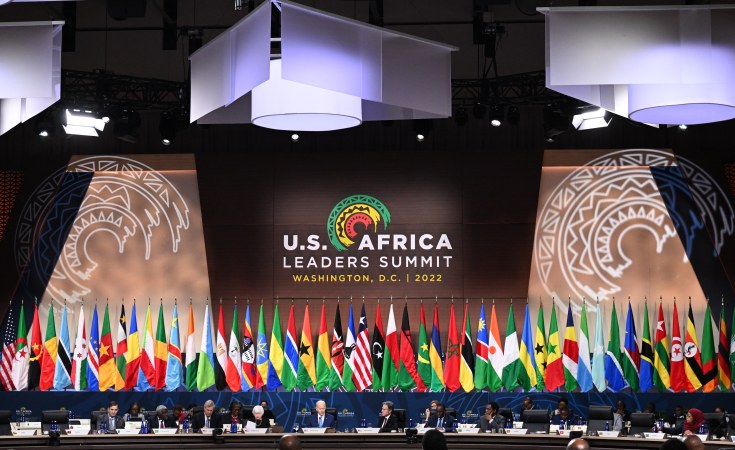Washington, DC — THE VICE PRESIDENT: Good afternoon, everyone, and welcome. It is my great honor to convene this group.
Needless to say, I think it has been clear over the last couple of days that our administration strongly believes African leadership in multilateral institutions is essential to address global challenges and within multilateral institutions. And our partnership will be grounded in candor, openness, inclusiveness, shared interest, and mutual benefits — because as I said on Tuesday, our administration intends to invest our time and energy to fortify partnerships across the continent and within multilateral institutions.
We are guided not by what we can do for Africa but by what we do with Africa. And as the President announced, I will be traveling to the continent next year, and very much look forward to furthering the relationships that are being strengthened over the course of these days.
Earlier today, you met with President Joe Biden on Agenda 2063 and discussed how we can support your leadership and vision of a fully integrated African continent. This session will build on that work. In particular, this session will focus on three key priorities: one, the promotion of international rules and norms that advance prosperity and security for all; two, a plan to strengthen cooperation between the United States and Africa in multilateral institutions; and three, an identification of ways to make progress within these institutions on pressing challenges, including the issue of food security, climate change, and security in the Sahel.
I am grateful for the opportunity to hear directly from each of you so we can build on areas of alignment and identify a plan of action through which we can jointly manage global and regional issues.
Regarding international organizations and initiatives, specifically the U.N. Security Council and the G20, African countries should be represented through permanent seats at the table.
The United States joins African nations to seek consensus on a significant expansion of the U.N. Security Council to include new permanent seats for countries in Africa, Latin America, and the Caribbean.
As President Joe Biden announced earlier today, our administration will also seek full membership for the African Union in the G20. And we look forward to working with the AU, the Indian G20 presidency, and other G20 members toward that end.
Our cooperation in multilateral institutions is vital for so many reasons, including that these are the institutions where we come together to uphold rules and norms. We gather at a time when many of these international rules and norms are under threat — for example, sovereignty and territorial integrity, unimpeded commerce, and the peaceful resolution of disputes.
Let us remember, these rules and norms exist for a reason. They advance security, stability, and prosperity around the world. They protect lives and livelihoods. And when they are violated, the effects are felt globally. For example, Russia’s brutal war in Ukraine has led to disruptions to food and energy supplies that affect all of our economies.
In light of this, we must all recommit to the rules and norms and the founding documents of the U.N. and the AU. We must defend them, promote them, and build on them.
Regarding the United Nations specifically, the Biden-Harris administration has worked and will continue to work to restore and strengthen America’s participation in the U.N. We will stand firmly behind the U.N. Charter and the spirit of the United Nations, which is centered around collective action to address problems that affect us all, including peace and security, public health, sustainable development, and human rights.
At the same time, we have heard from many of you who have concerns about the ability of the United Nations to fulfill its mission. As President Joe Biden said at this year’s General Assembly, the United States takes these concerns seriously. We commit to a more inclusive, effective, and credible Security Council, which includes promoting responsible behavior by all Security Council members, such as refraining from the use of the veto, except in rare and extraordinary circumstances.
Of course, our multilateral engagement and partnership extends beyond the U.N. The United States is a longstanding supporter of the African Union. In 2006, the United States was the first non-African country to establish a diplomatic mission to the AU. Since then, we have worked together to support peace building and prevent conflict across the continent. We have worked to strengthen the partnership between our private sectors. And together, our public health agencies have combated Ebola breakouts and COVID-19.
We also intend to strengthen the United States’ partnership with regional economic communities. We support these regional economic communities because, of course, they help foster integration in Africa and because each region, of course, has distinct challenges and needs.
Over the course of this session, let us work together to identify additional areas of cooperation between the United States and these communities.
As you know, yesterday, during the U.S.-Africa Business Forum, the United States Trade Representative signed a memorandum of understanding with the Africa Continental Free Trade Area Secretariat to help increase intraregional trade with Africa.
In the past two years, we have made important progress together, and we must and we will do more. As part of this, the United States is committed to working with African nations to strengthen our multilateral cooperation. I thank you each for your participation in this convening, and I look forward to our discussion.
And with that, I will now invite Commissioner Faki to speak. (Applause.)


